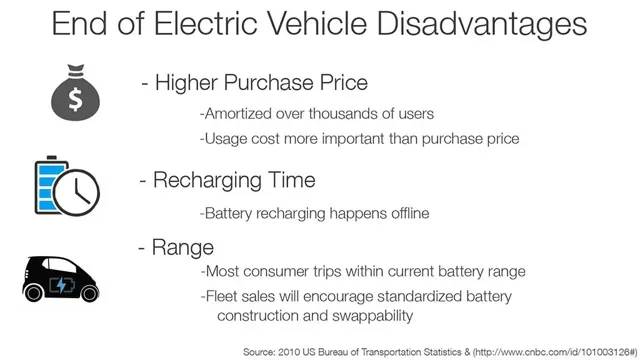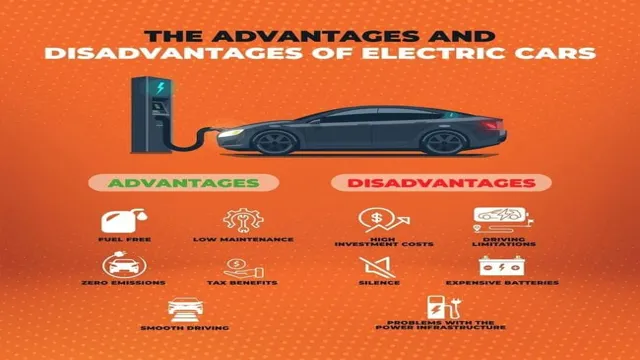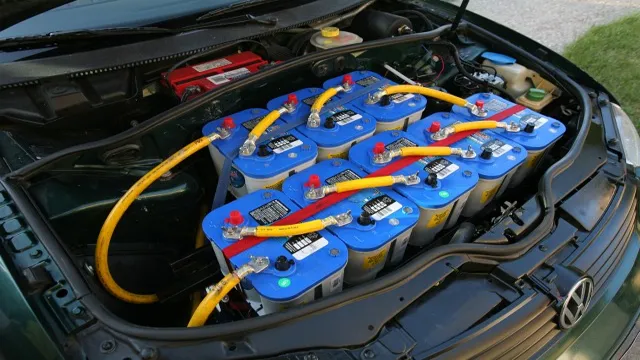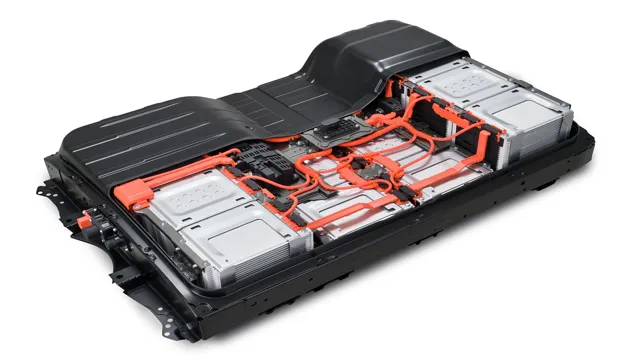The Dark Side of Electric Cars: Exploring the Disadvantages of Battery-Powered Vehicles
Electric cars have become increasingly popular in recent years due to their environmentally-friendly nature and economic benefits. However, not all aspects of these vehicles are perfect and seamless. One major disadvantage is their reliance on batteries, which have their own set of limitations.
Firstly, electric car batteries have a limited lifespan. Over time, their ability to hold a charge diminishes, leading to decreased range and performance. This means that the cost of replacing these batteries can be quite high, making electric cars less financially feasible for some consumers.
Secondly, the production of electric car batteries is not without environmental consequences. The mining and extraction of the raw materials required for these batteries involves a significant amount of energy and can also result in harmful waste products. Lastly, the disposal of electric car batteries can pose a challenge.
These batteries contain toxic materials that can harm the environment if not disposed of properly. As electric cars become more common, the issue of battery disposal will need to be addressed in order to minimize the impact on the planet. While electric cars are certainly a step in the right direction for reducing carbon emissions and reliance on fossil fuels, it is important to acknowledge their limitations as well.
As technology continues to evolve, it is possible that these drawbacks may become less significant. For now, consumers should carefully consider their options when it comes to choosing a vehicle that aligns with their values and needs.
Limited Range
One of the crucial disadvantages of electric cars is their limited range due to their battery capacity. Depending on the model, electric vehicles can run anywhere from 70 to 300 miles on a single charge, even with new advancements in battery technology. This limited range can be challenging for those who rely heavily on their vehicles.
Additionally, it means that users must plan out their trips carefully and make sure they can find a charging station if needed. With the help of a public map of EV charging stations, EV users must know ahead of time where they can recharge when they’re on a long journey. The good news is that as technology and infrastructure continue to advance, so does the potential for longer distances and more charging options.
Electric cars can’t travel as far as gasoline-powered cars.
When it comes to electric cars, one of the most common concerns that people have is range anxiety. It is true that, compared to gasoline-powered cars, electric cars have a limited range. However, this gap is constantly closing as electric car technology evolves.
Today, electric cars are capable of traveling up to 300 miles on a single charge. This may not be as much as what a gasoline-powered car can travel, but it is more than sufficient for most drivers’ daily needs. Moreover, the number of charging stations is also increasing, allowing EV owners to enjoy the same level of convenience as gasoline car owners.
What’s more, it is not just the long-range electric cars that are gaining popularity. Short-range electric cars, which are ideal for city driving, have been embraced by many urban dwellers who have no need for long-range travel. Plus, with the environmental benefits of driving an electric car, it is no wonder that more and more people are making the switch.
So while it is true that electric cars have limited range, it is not necessarily a dealbreaker for many drivers.

Long Charging Time
One of the biggest disadvantages of electric cars is their extended charging time. Unlike gas-powered vehicles that can be refueled in just a few minutes, electric cars take several hours to recharge fully. This inconvenience can be quite frustrating when you’re on a long trip and need to make frequent stops to recharge your car.
Furthermore, even if you’re using fast-charging stations, you’ll still need to wait for at least 30 minutes to an hour to charge your car. This could mean that you’ll need to plan your trips carefully, so you’re not caught off guard by a depleted battery. On the brighter side, some modern electric cars are equipped with larger batteries that can provide longer driving ranges, which means less time spent charging overall.
However, it’s still a hurdle that electric vehicle manufacturers must overcome to make electric cars more convenient and accessible to the average driver.
Electric car batteries can take hours to fully charge.
Electric car batteries may take several hours to charge fully, which can be frustrating for drivers who need to get on the road quickly. While it is true that electric vehicles are more efficient and environmentally friendly than gasoline cars, they also require more time to charge up. This is because electric cars use rechargeable batteries that rely on electrical energy.
Depending on the size of the battery and the charging rate, it may take anywhere from several hours to overnight to fully charge an electric car. For example, a typical electric vehicle with a 60-kWh battery may take about eight hours to charge from empty to full using a Level 2 charger. This can be inconvenient for drivers who are used to filling up their gas tank in just a few minutes.
However, it’s important to note that electric vehicle owners can use this time to their advantage by scheduling charges during off-peak hours, when electricity rates are lower. Additionally, some newer electric cars are equipped with fast-charging capabilities that can charge the battery up to 80% in as little as 30 minutes, making long charging times less of an issue.
Expensive to Replace
One major disadvantage of electric cars is the high cost of replacing the battery. While electric cars are generally cheaper to maintain than gas-powered cars, the battery replacement costs can be astronomical. The battery is the most expensive component of an electric car, and it can cost thousands of dollars to replace it.
Unlike gasoline-powered cars, where a simple battery replacement is all that’s necessary to get back on the road, electric car owners may need to replace the entire battery pack. This expense can catch owners off guard, making electric cars less affordable in the long run. Nevertheless, some car manufacturers offer extended warranties on their batteries, assuaging concerns of battery replacement costs.
Electric car batteries are costly to replace.
The cost of replacing an electric car battery can be rather hefty. Unlike traditional gas-powered vehicles, the battery is a significant part of an electric car’s technology. This means that if the battery fails, it often needs to be replaced altogether rather than just repaired.
Depending on the make and model of the car, the battery replacement alone can range from a few thousand to tens of thousands of dollars, which can be a significant expense for car owners. For example, the cost of replacing a Tesla Model S battery pack can be upwards of $20,000. It’s essential for electric car owners to consider the cost of maintaining and replacing the battery when deciding if an electric vehicle is right for them.
While the cost may seem high, it’s important to note that electric cars tend to have lower maintenance costs overall, and the savings on fuel can lead to significant long-term savings for drivers.
Heavy
Electric cars are a great innovation for the environment and for efficiency, but they still come with their own set of disadvantages. Perhaps the biggest disadvantage of electric cars is their battery weight. The heavy, bulky battery can make the car heavier overall, which reduces its range and performance.
In addition, because batteries are still relatively expensive to manufacture, they are often used in smaller sizes, which limits the amount of power the car can store and use. This means that electric cars have a lower range and are less powerful than their gasoline counterparts. Despite these drawbacks, electric cars remain a popular choice for environmentally conscious consumers who value efficiency and want to reduce their carbon footprint.
Therefore, battery technology is improving rapidly, making electric cars more practical and efficient with each passing year.
Electric car batteries add weight to the car, affecting performance and handling.
Electric cars are gaining popularity worldwide due to their environmentally friendly nature and economic benefits but they do carry a downside too. One concern that is often raised about electric vehicles is the weight of their battery packs. The batteries used in electric cars are generally heavy and can significantly add to the weight of the vehicle, affecting its overall performance and handling.
The added weight from the batteries increases the force of inertia that the car has to overcome, reducing acceleration and slowing down its agility on the road. However, many electric vehicle manufacturers are working on newer battery technologies that are lighter and more durable. By introducing lighter-weight batteries, these companies aim to improve the performance and handling of electric cars while also making them more affordable and practical for everyday use.
As technology continues to advance, we can expect future electric vehicles to be even more efficient and agile than the ones that are currently available.
Environmental Impact
While electric cars are an excellent alternative to gas-powered vehicles, there are disadvantages to the batteries used in electric cars that must be considered. One of the main concerns is the environmental impact of the batteries. While most electric car batteries are recyclable, there is a significant environmental impact to creating them.
The manufacturing process of these batteries can release a significant amount of greenhouse gases, like carbon dioxide, which can negatively impact the environment. Additionally, the mining of materials like lithium, cobalt, and nickel, which are used in the batteries, can have damaging effects on the environment. We must weigh the benefits and drawbacks of electric cars, including their environmental impact, when considering the adoption of this technology.
The production and disposal of electric car batteries can have negative environmental effects.
The popularity of electric cars is growing fast, and while they offer a more eco-friendly transportation option, they are not without their environmental impact. The production and disposal of electric car batteries can have negative effects on the environment. The batteries require certain materials, such as lithium and cobalt, which are often extracted through mining activities.
These activities can cause deforestation, water pollution, and soil erosion. Additionally, the production of electric car batteries requires a significant amount of energy, which can result in greenhouse gas emissions. When electric car batteries reach the end of their life, they must be disposed of carefully to avoid further environmental harm.
The batteries contain toxic and hazardous materials that can leach into the soil and water if they are not disposed of properly. Proper disposal methods, such as recycling and repurposing, can minimize the environmental impact of electric car batteries. While the production and disposal of electric car batteries can have negative environmental effects, the benefits of electric cars, such as reduced emissions and better fuel efficiency, still outweigh the negatives.
Conclusion
While electric cars present numerous benefits such as environmental friendliness and low operating costs, the elephant in the room – or rather, the battery in the car – presents a few limitations. While range anxiety, long charging times, and potential degradation may seem like significant disadvantages, these are mere bumps in the road on the journey towards a sustainable future. After all, even the most efficient and reliable machines have their limitations, and with continued innovation and advancements in battery technology, the disadvantages of electric car batteries will inevitably be overcome.
So let’s keep driving towards a greener, brighter future – even if we need to pull over and recharge once in a while!”
While electric cars have many benefits, battery technology still has some drawbacks that need to be addressed.
When we think of electric cars, we often associate them with being environmentally friendly and sustainable. While this is certainly true to some extent, it is important to consider the environmental impact of the batteries that power these vehicles. The production of lithium-ion batteries releases a significant amount of carbon dioxide into the atmosphere, contributing to the very issue that EVs are meant to combat.
Additionally, the mining of materials like cobalt, nickel, and lithium for battery production can have negative impacts on local ecosystems and communities. While strides are being made to improve the sustainability of battery production, it is clear that there are still significant challenges to overcome in order to make electric cars truly green. As consumers, it is our responsibility to stay informed about the environmental impact of the products we buy and to push for more sustainable solutions.
FAQs
What are the main disadvantages of electric car batteries?
Electric car batteries tend to have limited range, which can be a major inconvenience for drivers who frequently travel long distances. In addition, replacing an electric car battery can be quite costly, and the batteries may not last as long as the rest of the car.
How do electric car batteries differ from traditional car batteries?
Electric car batteries are typically much larger and heavier than traditional car batteries, as they need to provide power to an electric motor for extended periods of time. They also tend to be more expensive and require specialized maintenance.
Are there any environmental concerns associated with electric car batteries?
While electric car batteries are generally considered to be better for the environment than traditional gasoline-powered engines, they do pose some environmental risks. The materials used in electric car battery production, such as cobalt and lithium, can have negative environmental impacts if not managed properly.
What advancements are being made in electric car battery technology?
Researchers and engineers are constantly working to improve electric car battery technology, with innovations such as new battery chemistries, faster charging times, and longer ranges all being pursued. As technology continues to improve, the drawbacks associated with electric car batteries are likely to lessen.





